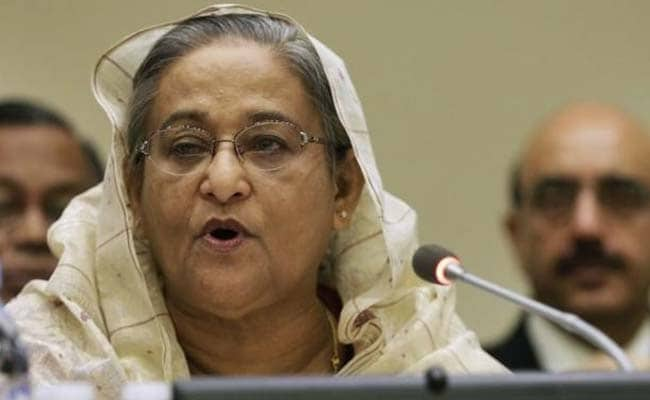
Bangladesh has, so far, carried out judicial execution of six condemned war criminals.
Dhaka:
Terming Pakistan a "defeated force", Prime Minister Sheikh Hasina today said Islamabad's protests over recent execution of a 1971 war crimes convict prompted Bangladesh to pull out of the SAARC Summit.
"Pakistan is a defeated force. We defeated them in our Liberation War (in 1971), as a defeated force they can tell many things which matters little to us... Pakistan's view is nothing but the aspersion of a defeated party, which people of Bangladesh should consider in that manner," she said.
Pakistan's protests over recent executions of a 1971 war crimes' convict prompted Bangladesh to take the decision not to join the 19th SAARC summit to be held in Islamabad, Hasina said in Dhaka, a day after returning from New York where she attended the UN General Assembly.
"The diplomatic ties will be there... we will face them (Pakistan) diplomatically," the Prime Minister said.
She asked Bangladeshis to think about the relationship of "cohorts and patrons" of perpetrators of 1971 war crimes against humanity who carried out genocides siding with Pakistani troops during the Liberation war, in an oblique reference to main opposition Bangladesh Nationalist Party (BNP) led by former prime minister Khaleda Zia.
"BNP's founder General Ziaur Rahman rehabilitated them (war criminals) after 1975... She (Zia) rewarded the (now executed) war criminals making them ministers in her cabinet.
"Before severing diplomatic relation with Pakistan, people of Bangladesh should consider cutting off links with their local cohorts and boycott them in the social and political arena," Hasina said.
Asked what is her government's stand on the escalating tensions between India and Pakistan, Hasina said the situation "concerns us".
"We do not want any tension, war-like situation... in that case we will also be affected and our development of the region will be disrupted. What we sincerely expect is the two countries will settle their issues through dialogue bilaterally," she said.
Ties between Bangladesh and Pakistan witnessed strain after Dhaka initiated the trial of Bangladeshi perpetrators of 1971 war crimes in 2010 in line with Hasina's electoral pledges, with Islamabad repeatedly condemning the trials.
In the latest such incident, Pakistan reacted to execution of a business tycoon and Jamaat-e-Islami leader Mir Quasem Ali last month saying "the act of suppressing the opposition, through 'flawed trials', is completely against the spirit of democracy", angering Dhaka.
Bangladesh has, so far, carried out judicial execution of six condemned war criminals, five being leaders of Jamaat which was opposed to the 1971 independence.
The 19th SAARC Summit was postponed after the pull-out by India, Bangladesh, Bhutan and Afghanistan indirectly blaming Pakistan for creating an environment which was not right for the success of the meet. Later, Sri Lanka also pulled out of the summit which was scheduled for November 9-10 in Islamabad.
"Pakistan is a defeated force. We defeated them in our Liberation War (in 1971), as a defeated force they can tell many things which matters little to us... Pakistan's view is nothing but the aspersion of a defeated party, which people of Bangladesh should consider in that manner," she said.
Pakistan's protests over recent executions of a 1971 war crimes' convict prompted Bangladesh to take the decision not to join the 19th SAARC summit to be held in Islamabad, Hasina said in Dhaka, a day after returning from New York where she attended the UN General Assembly.
"The diplomatic ties will be there... we will face them (Pakistan) diplomatically," the Prime Minister said.
She asked Bangladeshis to think about the relationship of "cohorts and patrons" of perpetrators of 1971 war crimes against humanity who carried out genocides siding with Pakistani troops during the Liberation war, in an oblique reference to main opposition Bangladesh Nationalist Party (BNP) led by former prime minister Khaleda Zia.
"BNP's founder General Ziaur Rahman rehabilitated them (war criminals) after 1975... She (Zia) rewarded the (now executed) war criminals making them ministers in her cabinet.
"Before severing diplomatic relation with Pakistan, people of Bangladesh should consider cutting off links with their local cohorts and boycott them in the social and political arena," Hasina said.
Asked what is her government's stand on the escalating tensions between India and Pakistan, Hasina said the situation "concerns us".
"We do not want any tension, war-like situation... in that case we will also be affected and our development of the region will be disrupted. What we sincerely expect is the two countries will settle their issues through dialogue bilaterally," she said.
Ties between Bangladesh and Pakistan witnessed strain after Dhaka initiated the trial of Bangladeshi perpetrators of 1971 war crimes in 2010 in line with Hasina's electoral pledges, with Islamabad repeatedly condemning the trials.
In the latest such incident, Pakistan reacted to execution of a business tycoon and Jamaat-e-Islami leader Mir Quasem Ali last month saying "the act of suppressing the opposition, through 'flawed trials', is completely against the spirit of democracy", angering Dhaka.
Bangladesh has, so far, carried out judicial execution of six condemned war criminals, five being leaders of Jamaat which was opposed to the 1971 independence.
The 19th SAARC Summit was postponed after the pull-out by India, Bangladesh, Bhutan and Afghanistan indirectly blaming Pakistan for creating an environment which was not right for the success of the meet. Later, Sri Lanka also pulled out of the summit which was scheduled for November 9-10 in Islamabad.
Track Latest News Live on NDTV.com and get news updates from India and around the world

